BBC's Blog, page 22
April 21, 2013
BBC iD: Making sign in simple
Hello, I'm Richard Northover and I'm the product manager of BBC iD, the BBC's sign in system.
We've been working for a while on some changes to the way BBC iD works which we hope will make it better all-round. Some of the improvements have appeared already but there are more to come, so this post is an explanation and an update on where we are.

New look BBC iD
Before we get to that, it might be useful to say a bit about what BBC iD is and what it means to 'sign in' in the first place.
Who are you?
When you 'sign in' you're letting a website know it's you. By 'registering' you set yourself up as someone who can sign in and be remembered by the site between visits. In order to make sure it's the same you each time and not someone else you choose a password.
This process is more or less the same all over the web but the reason you sign in can differ wildly from one site to the next.
For some websites signing in is fundamental. They present information specifically for you, created as a result of the information you provide (via the things you do) over time. If you don't sign in, there is no 'you' and that exchange can't happen.
Today most visits to BBC Online are by people who are not signed in. This is because watching, listening and reading aren't, by themselves at least, activities where who you are is fundamentally important.
But there are many things you can do when you're signed in at the BBC and thousands of new BBC iDs are registered every day by people doing them. They may be commenting on a BBC News or Sport article, or on a blog post like this one.
Many of them will have added programmes or recipes to their list of favourites so that they can come back and find them later. And thousands of children play CBBC's games, signing in to record their high scores or to challenge their friends to play with them:
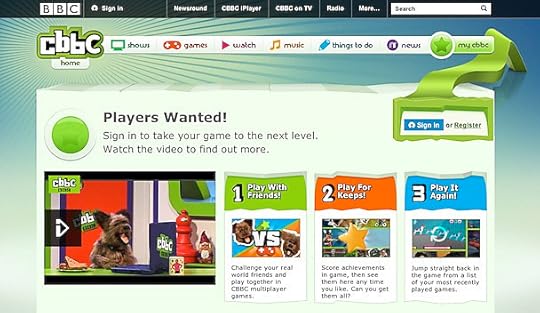
Sign in to play CBBC games
As time goes on there will be many more features of BBC Online that build on the fact that it's you who's visiting and they’ll be spoken about in future posts by the people building them.
Meanwhile signing in, particularly across multiple devices, is becoming an increasingly useful thing to be able to do, and we're working hard to make it that as easy as possible.
Now, the update.
Simple sign in
There are two things to tell you about: the first is the introduction of an improved version of BBC iD and the second is a specific feature of it.
For a little while now we've had two versions of BBC iD: the old one, first announced back in 2009, and the new one launched just before the Olympics last year. We're gradually switching from one to the other and most areas of BBC Online have made the move.
Importantly, these two versions are able to work together which means that you don't need to re-register or do anything differently.
Apart from looking slightly different and being able to handle more people using it at the same time, the new version is simpler. Central to this is that it collects less information.
Less is more
In the past the BBC iD registration process asked for quite a lot of things. Regardless of what you were doing you had to think up a username, choose a password and enter your full date of birth.
It then asked for your email address and gave you the option to choose a 'display name' to appear next to any comments you might or might not make.
While this process was justified at the time it was designed - when commenting was the main reason why people registered - there are now things you can do on bbc.co.uk that don't need to know as much information.
For example, iPlayer Radio lets you save programmes and clips to listen to later with the 'add to favourites' button. You need a BBC iD for this feature to work (otherwise we don't know whose favourites are being added and they won't be able to move between devices) but your age doesn't matter in the same way that it can for other things.
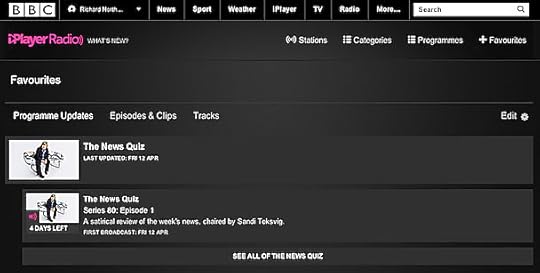
Sign in to save your favourites on iPlayer Radio
If something doesn't matter for what you're doing right now we won't ask for it.
If you decide later to do something that does need your age, such as make a comment on an article or blog post, we'll ask for it. Similarly, unless we specifically need your email address you're free to sign in with a username instead.
Taking this to its logical conclusion we've added the option to register without having to provide any information at all. No password, nothing.
Other ways to sign in
As explained at the start of this post, registration is about setting up a way to let a site know who you are. Signing in is being able to prove (to some level at least) that it's you. The email address (or username) and password that you set up during registration are the things that give that proof.
But if you already have a way to prove that you are who you say you are with another website, then, with your permission, we can take their word for it.
Doing this involves BBC iD being able to exchange specific information with other sign in systems and this is done with a standard mechanism called OAuth 2. When you want to sign in to the BBC we send you to your chosen site.
The options available to sign in from other sites so far are Facebook and Google, and you sign in there as normal. They then send you back to the BBC, along with an access code that lets us check that it's you. If you're already signed in to the other site, then this process is instant.
It's private
It's important to say that the integration between BBC iD and external sites like Facebook and Google is deliberately limited.
Nobody has any access to your activity at the BBC and nothing is shared or posted on your behalf.
Linking your BBC iD to one of these sites is purely to remove the need for you to think up another password and make signing in easier.
We don't take any personal information from external sites and nothing goes to them, either at the point of registration or at any point after that. (If any of this were to change it would only be with your permission.)
All in all this makes signing in and registering about as simple as it's possible to make it: by default you don't need to provide any information at all. If you want to comment, you still have to provide some extra details, but to 'add to favourites' it's just a matter of giving permission and... that's it.
If you already have a BBC iD you can retrospectively link it which means that you too can sign in without having to remember another password.
Sign in everywhere
Finally, sitting in the top left of all BBC pages you'll have noticed the 'sign in' link. This doesn't yet mean that all BBC products can make equally imaginative use of the fact that you're signed in but it does mean that, having seamlessly signed in with a single click, you can consistently access your settings and yes, sign out if you want to.
We'll be making lots of improvements and additions over the coming weeks and months and there will no doubt be things to iron out as we go along. If you have any questions, suggestions or feedback, please feel free to comment. You'll need to sign in of course.
Richard Northover is the product manager of BBC iD.
April 19, 2013
What's on BBC Red Button 20-27 April
It's all about Sport on Red Button this week - literally. We have a full schedule of sport coverage, from the London Marathon to live Championship snooker, Bahrain Grand Prix highlights and MotoGP. Please note there's no Antiques Roadshow play along this week, but you can still join in via the free mobile app.
The 2013 London Marathon
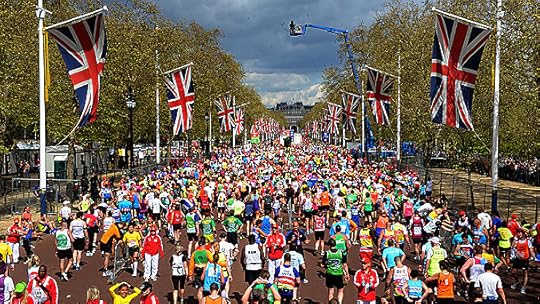
Competitors running during the 2012 London Marathon in London
On Sunday 21 April follow the 33rd annual London Marathon with our extended coverage, including finish-line cameras and the women’s race live and uninterrupted. Watch 36,000 fundraisers and elite runners compete in one of the world's most colourful races.
Motorsport on the Red Button
It's also the Formula 1 Bahrain Grand Prix this weekend - we bring you extensive coverage of the race from Bahrain International Circuit in Sakhir including all the build-up and highlights from both qualifying and the race itself.
That's not all for motorsport lovers - we've also got MotoGP on the Red Button. Moto2 and Moto3 is live from Austin, Texas for the first time as two Spaniards, Espargaro and Salom, look to defend their leads from the opening races.
Snooker World Championship

A cue in action at the snooker World Championship
Don't miss live World Championship snooker and highlights on BBC Red Button. Ronnie O’Sullivan is back from his self-imposed exile and ready to defend his World Championship title. Stay on cue as we bring you live coverage from the Crucible in Sheffield throughout the week, plus highlights overnight.
For a full list of Sport coverage on Red Button and times see the BBC Sport website. Please note times are subject to change.
College of Production Round-up
I’m Denise Roach, content producer at the BBC College of Production (CoP) website.
Our site is a free online learning resource for the radio, television and online production community offering videos, podcasts and articles from broadcasting innovators and experts.
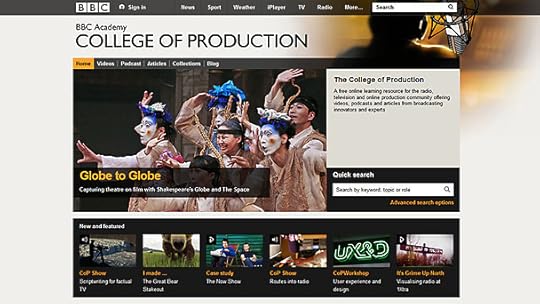
The College of Production website
It’s been all about innovation on the CoP site this week as we published the first of our films in the This Works… series. These short films from the BBC Academy showcase production innovation and new ways of working that are pushing the boundaries of what is possible creatively and technically.
Visualising radio might sound like a contradiction in terms but it’s a key weapon in Radio 1’s battle to win new radio listeners from an ever growing number of discerning YouTube audiences. Enter 1Xtra presenter Charlie Sloth and producer Sam White who set out on the ambitious challenge to make a TV documentary on a radio budget.
The result: multiplatform documentary It’s Grime Up North following Charlie and Sam on a road trip to find out why rap talent in the UK is dominated by the London scene. Adding a visual layer to a radio documentary meant it could be watched online and on the Red Button as well as listened to like a conventional radio show, and with impressive results.
Documentaries on 1Xtra attract around 30,000 listeners. So far,It’s Grime Up North has attracted 162,000 YouTube viewers and counting.
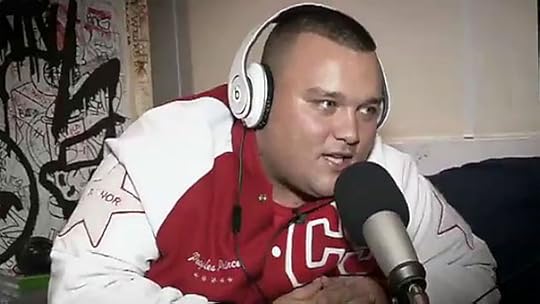
Charlie Sloth in video It's Grime Up North
As boundaries shift between radio and its audiences broadcasters are increasingly looking to new territory to keep pace with this change. 6 Music Live at Maida Vale is a great example.
We followed video producer Guy Oldfield and presenter Lauren Laverne around the staging of the live radio event, and spoke to Guy about how he sees radio changing.
For him, “Online really is the platform where all content should live. It’s an amazing environment in which to produce new types of broadcasting.”
And while the army of robotic cameras used in the broadcast and funky redesign of the studio have a lot to do with the success of the shows, having a presenter who ‘gets’ how radio and online work has a massive part to play too. You can see Lauren in action on the CoP website.

Staging of a live event on BBC 6 Music
Creativity loves constraint and nothing is more constraining in production than having no money. Stepping away from the radio, CoP entered the world of budget film making this week with the CoP Show podcast: Budget film making, and indie-zombie-film making in particular.
Budding film makers are constantly being told that it’s never been easier to produce, package and market your own film, but where do you really start? Where does the money come from (even if it’s only £45)?
From crowd-sourced funding to maxing out your credit card, distributing your film online and having your moment in the limelight at Cannes, we got a panel of seasoned indie experts to give us their tips.
It was an animated debate and one of our most popular shows, proving that the appetite of the wannabe Bigelows and Boyles out there is as strong as ever.
Denise Roach is a content producer for the BBC College of Production.
Proms Digital Guide
I’m Laura Davis, publications editor for the BBC Proms. One of my responsibilities is to manage the production of the annual BBC Proms Guide, a book that contains full concert listings for the Proms season along with newly commissioned editorial articles and supplementary information.
When I took over my role in January 2012 the Proms Guide had previously only been produced in a printed format so I set about investigating how we could also produce the content digitally for the 2012 season.

The Proms Digital Guide - Opening page with thumbnail images of contents within that chapter
This was a great opportunity to appeal to a different audience, a younger, tuned-in and demanding audience, while providing an alternative reading experience for our established Guide audience.
Tablets sit at the heart of the Proms’ digital strategy. During the 2012 season over 40% of visits to the Proms website were from mobile phones and tablets. This along with the continuing upward trend in ebook sales figures across the publishing industry shows that consumers are keen to consume information in this way. It is both portable and convenient and on a tablet device the book sits alongside all of the user’s other media.
At this point there were only limited options for converting highly designed picture books like the Guide into ebooks so I decided to dip the Proms toes in the water first by producing just the concert listings section and some complementary bits and pieces as an ePub.
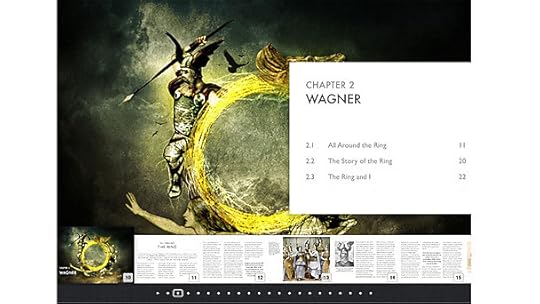
Opening page for Wagner article including table of contents and thumbnails of the pages in the article
As the ePub format is flexible, optimising the display of information according to the device on which it’s viewed, it can reach the largest number of people across the widest range of mobile devices. However, it is really only suitable for text-based content rather than our attractive and image-filled Proms Guide.
This, along with a version for Kindle e-reader (which doesn’t support ePub), garnered a few hundred downloads and showed the appetite among Proms fans to access Guide content in this way.
I wanted to increase our ambition for the 2013 Guide, making use of my talented and eager in-house designer Christie to produce something just as attractive as the printed Guide but fully optimised for digital devices.
I had dismissed the idea of making an app (too expensive and overlapping with the functions of the Proms website) or producing a series of ebooks optimised to various devices (far too expensive!) when a colleague in BBC Research and Development contacted me regarding the possibility of publishing Proms material using iBooks Author (IBA).
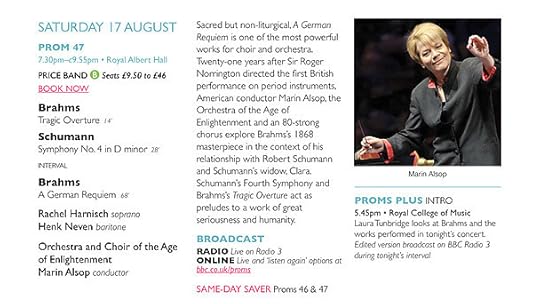
The guide features day by day concert listings with one screen per concert and a direct link through to the booking site
He had been playing around with the software and thought that the Proms would be a good fit for it given our access to a wealth of written editorial content, images, audio and video. This would be the first time the BBC had used IBA to produce a product which is being sold.
IBA is a free piece of software for creating ebooks on iPads. Although this means we are limited to the iOS market, we felt that using it this year offered the best way to utilise BBC resources and reach the single largest tablet ownership market.
We will look at developing for different devices next year and, with support from the distributor, this year we have also been able to create a Kindle version. While not optimised for the device in the way the IBA version is, it will still allow us to reach another new audience and increase our presence on tablet devices.
Now all Christie and I had to do was teach ourselves how to use a new piece of software and produce a re-designed and fully optimised ebook in the two weeks available to us after we had signed off the printed version!
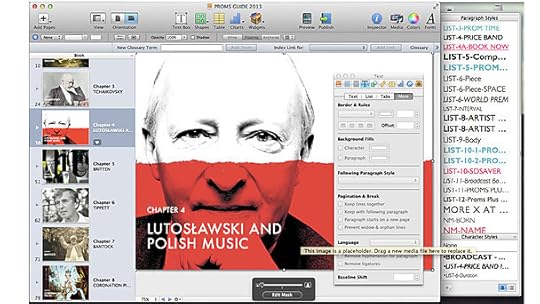
Editing and scaling images in iBooks Author with paragraph and character styling
The biggest problem we faced was creating a design that worked effectively in both landscape and portrait modes. The landscape orientation is the most natural fit for the Guide, the screen-by-screen layout offering some level of consistency with the spread-based layout of the printed product.
The scrolling text layout of portrait mode meant Christie had to amend text spacing and adapt certain design elements such as quote mark images that sat behind displayed quotes as they popped up in the most unlikely positions.
It was a case of constant, rigorous testing to design the layout in landscape mode and edit it in portrait mode. This commitment to scrutiny was important to us to guarantee the best level of user experience: we didn’t want to have to resort to locking the orientation in landscape mode.
We also had to amend the font for chapter titles from our beloved Gill Sans (the standard BBC Proms publications font) to Futura. This was because, even though IBA has a provision to embed custom fonts, Gill Sans took a second to resolve itself into focus when a page opened, something that doesn’t happen with the installed fonts. This would have looked like an error to the user and compromised the user experience.
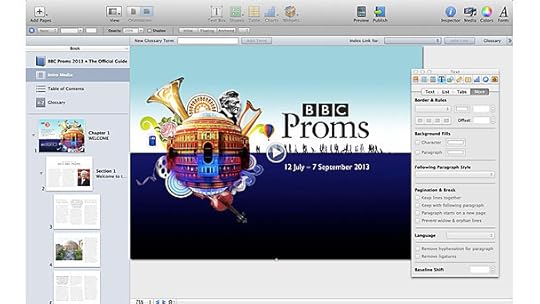
Inserting audio treatments into the publication
However, the finished Guide is not just a book that happens to work on tablets but is a book for tablets, thus demonstrating the BBC’s commitment to optimising content for emerging platforms.
We included image galleries showcasing the lovely pictures that didn’t make it into the printed Guide because of space limitations, and links directly from each concert listing to the ticket-booking webpage, thus ensuring a smooth user journey from information to action and ultimately to the Prom!
There are many avenues we could explore for future digital versions of the Proms Guide and I will certainly be focussing my efforts on including audio and video, a perfect fit for this product. I’d be interested to hear your thoughts on the road we’ve taken so far and how we could develop the ebook further.
Laura Davis is publications editor for the BBC Proms.
Stargazing LIVE: Astronomy through social media
Hello there I’m Simon Mackie, an assistant producer for BBC Factual, but I don’t make telly programmes. Instead I work with TV production teams to develop and publish online content that complements their programmes. So I’m a web producer really.
Here I’m going to talk about the online side of the BBC Two series Stargazing LIVE and in particular how we use social media. With around 276,000 visitors/unique browsers to the website in a week and 27,000 followers on Twitter it’s one of the biggest and best things I work on. I won’t lie, I love it.
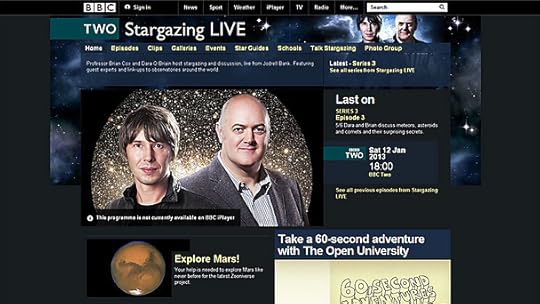
Stargazing LIVE
Stargazing LIVE is about so much more than watching telly. It's about giving people the info and encouragement they need to get involved with real astronomy. There are stacks of downloads, videos and other goodies on the Stargazing website including the Star Guide 2013 which alone was downloaded 60,000 times in January.
Managing all the content on the website and liaising with the people who make it is a big part of my role. The analogy I use is that of the website as a shop where I’m the shopkeeper. Helped by colleagues I need to make sure everything is on the shelves and in the shop window in time for the grand opening - when Professor Brian Cox and Dara O Briain tell over three million viewers go to the site. Yikes.
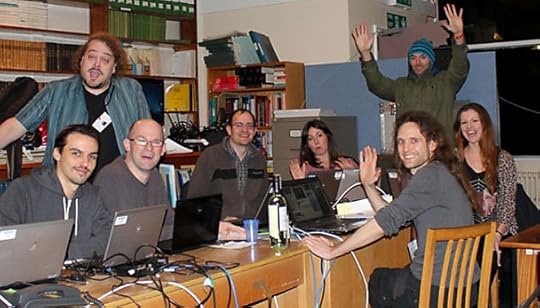
The web team and scientists during a live web chat at Jodrell Bank. I think I’m ‘reaching for the stars’
On location at Jodrell Bank I’m part of an experienced web team that includes Peter Harvey, Brett Tremble and Irene Kalkanis (all from BBC Learning) plus Alex Dackevych (BBC Factual). We share desks with the TV team in a makeshift production office. It’s hectic, cramped and cold but for those few days it feels like the centre of the Universe.
Before going on I should also thank the BBC social media experts, web developers, content producers and commissioning executives (bosses) who weren’t on location but did make it all happen.
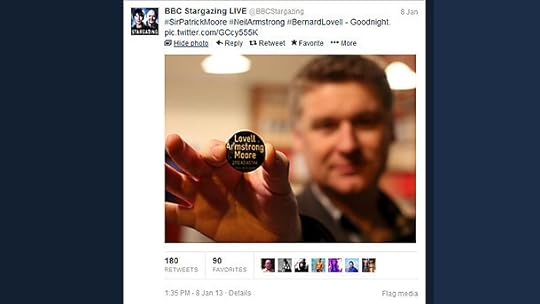
Our final tweet of the first night featured Jodrell Bank’s Tim O'Brien with a poignant message and was retweeted 181 times
So there’s all the stuff on the website but to make it a two-way conversation we use Twitter, Flickr, live web chats and online citizen science projects.
This year the time was ripe to run a Twitter account, @BBCStargazing, rather than flashing up an onscreen hashtag. More people are tweeting with each passing day and the TV team had a real appetite to make Stargazing more participatory than ever before.
By the way, at the Beeb we can’t open Twitter accounts willy nilly. First we speak to our social media experts who ensure that we’ve got the right experience and a long-term plan to offer relevant and fun content. As I run another Twitter account at the BBC it made sense that I'd kick things off for Stargazing before sharing duties with colleagues from BBC Learning. They’re still tweeting even though the programme is off air, so keep following.
And what did we use Twitter for? Well the account’s description (or ‘promise’ as I call it) at the time said 'news, event details and behind-the-scenes photos'. The wording was very deliberate. That’s all stuff I knew we could tweet quickly and easily. With little time to prepare it was a case of tweeting by your wits and being alert to photo opportunities. Oh and being nice to people – everyone likes a free badge.
One thing I didn’t want to do was invite loads of questions that we couldn’t fully answer on Twitter. The place for those was on Stargazing: Back to Earth, an extra programme that immediately follows the main show. It’s more relaxed and chatty, the perfect format for the presenters and guests to answer viewers’ questions.
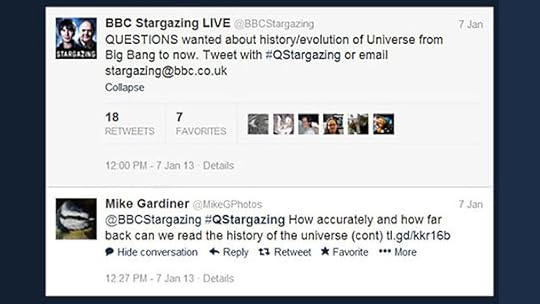
We asked our Twitter followers for their questions – a selection were answered in Stargazing: Back to Earth
So in the days or even minutes before each show we sent out tweets asking for astronomy questions. And so that the Back to Earth team could search for the questions in their Twitter feeds we asked people to include #QStargazing in their tweets.
I think we did pretty well on Twitter. Only one person manned the decks at a time but by the end of the series we’d tweeted over 700 times to 27,000 followers. Altogether there were more than 66,000 tweets made by people about the show. We even had a direct message from Chris Hadfield, an astronaut on board the International Space Station (still boggles my mind).
Saying that, the fantastic response to the programme on Twitter meant it was hard to stay across it all. Indeed, #stargazinglive trended worldwide for 15 minutes during the first episode. Next time (if they ask me back) I’d like to plan even more – though you still need to be spontaneous and react to unfolding events.
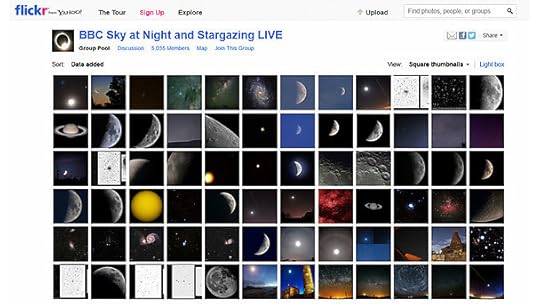
Stargazing LIVE and The Sky at Night flickr group
Right, I’ll quickly whizz through the other ways we grabbed the audience with our social tentacles, starting with Flickr.
Ever since Stargazing started in 2011 it’s shared a flickr photo group with The Sky at Night. I wasn’t involved back then but it was a smart move to tap into this existing and passionate astrophotography community and great to join up a revered BBC astronomy show with the new kid on the block.
Beyond the simple pleasure of sharing your starry snaps with others, there’s a further incentive: national fame! Each night on Back to Earth astronomer Mark Thompson discusses his favourites. And it’s a handy resource for making extra online content too, such as this audio slideshow. As I write the Flickr photo group comprises almost 5,000 members and over 31,000 uploads.
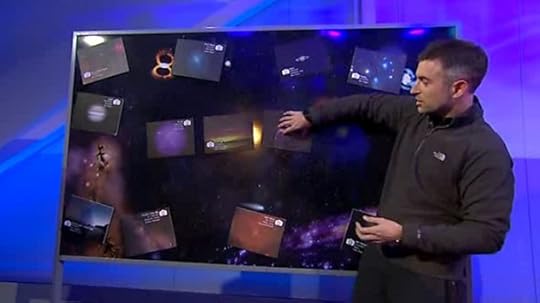
Astronomer Mark Thompson shows his favourite snaps from our flickr photo group on live TV
Another way we spoke directly with the audience was through three live web chats with bona fide scientists. Each night several astronomers, including a NASA expert in Houston, answered users’ questions as the show aired. We also used the chats to post pre-prepared behind-the-scenes photos, news and relevant facts.
There was an average of 3,350 users taking part each night and next year if we do them again I’d like Brian and Dara to shout from the rooftops that the chats also work on smartphones and tablets. And maybe we could look at doing them at different times - possibly earlier in the day when we could even coordinate with schools for a new and captive audience.
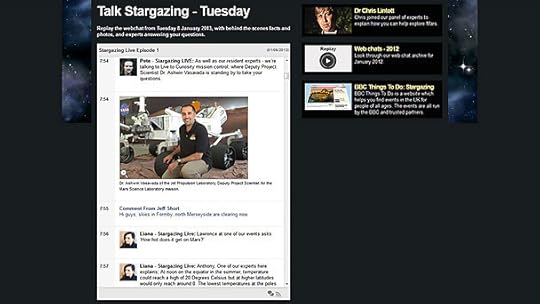
Live web chats
Finally, let’s explore Mars. Yes, really. Last year we teamed up with Zooniverse, the pioneering online citizen science group, and made quite a discovery. After that success we wanted to offer something similar again and so Planet Four was born. The gist is to help scientists understand more about the surface of Mars by getting the audience to spot particular features in photos taken by NASA’s Mars Reconnaissance Orbiter.
My part was easy. I just had to speak to Dr Chris Lintott, the man behind Zooniverse, about when to put a big fat link on the Stargazing website. So far almost 70,000 participants have contributed to this real science by classifying over 3.6 million images. In most cases no human eye has ever seen these images before, I think that’s just brilliant.
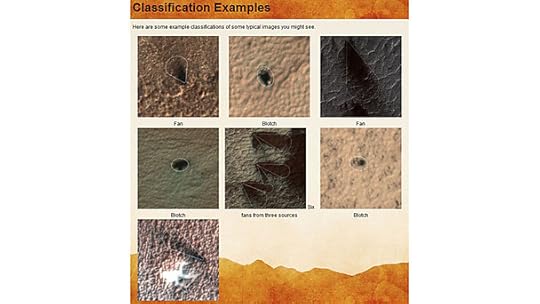
Planetary scientists need your help to understand the surface of Mars on Planet Four
I hope that gives you some insight into my role on Stargazing LIVE and how we use the web to interact with the audience at home. The Beeb’s mission is to inform, educate and entertain – hopefully we’ve added a little inspiration and discussion too.
Many thanks to the TV production team and our hosts at Jodrell Bank for yet again being so web-friendly.
Feel free to ask me anything in the comments below.
Simon Mackie is an assistant producer for BBC Factual.
April 18, 2013
Knowledge & Learning Beta: Welcome to the new site
Hi I'm Chris Sizemore executive editor for the BBC's Knowledge & Learning product.
Today marks the beginning of a journey to unlock the learning potential of BBC content. As a first step we are releasing a new website which we’re currently calling Knowledge & Learning Beta.
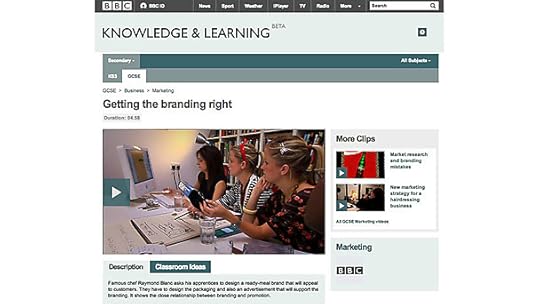
GCSE Class Clips content on the new Knowledge & Learning Beta
When complete the Knowledge & Learning product will bring together factual and learning content from over 100 existing BBC websites, from Bitesize to Food to Science to History and will forge them into a single consistent user experience designed to make learning feel effortless and delightful.
The product will play a 'glue' role too, helping bind the different parts of BBC Online together for audiences.
The content produced by the Knowledge & Learning (K&L) team ranges from the recent Great British class calculator, revision guides for students, BBC programme clips to be used by teachers in classrooms to topical features around the arts, history, food, science, natural history and more.
We hope to redefine how our audiences consume this educational and factual content by effectively combining technology with storytelling.
Our latest phase
We have already transformed the way in which we produce content within our topical genre sites such as Nature, History and Science. What we are announcing here is another major step towards realising our ambition.
For the all-new Knowledge & Learning Beta website our initial focus has been twofold: First, we’re rolling our topical genre content into this new site. We aren't changing the URLs but we are changing the visual banner on, for instance, the History index and pages. Second, we’re adding to the new site our Class Clips audio/visual resources that help teachers create engaging classroom discussions for students.
Over the coming months we’ll be migrating all the content we create for teachers, students and lifelong learners into the new site.
The existing Class Clips website is well loved and used by many thousands of teachers and students each week. However, the current experience isn’t optimised for mobile or tablet which is increasingly important in the classroom.
Our new website has been built from the ground up using responsive web design, meaning that the content can be viewed just as easily on any web browser, on any screen size, and on any platform.
Our team have used a sophisticated system that detects the capabilities of each browser and device and serves just the content that’s appropriate in order to minimise download times. We will build from this solid base as we add new areas to the Knowledge & Learning Beta website.
One of the biggest challenges of the project so far has been re-processing all of the content that resided in Class Clips. Over the past five months we’ve transcoded everything again, ensuring that there are high-quality versions of each clip that will play out on any device.
In parallel the team has also been reviewing all that content, assigning it a place in the new information architecture and, in some cases, rewriting the notes for the classroom. This content is organised around the UK’s national curricula.
To start with we’ve included around 2000 of the 10,000 programme clips that currently reside in Class Clips and we’ll be adding the rest over the coming weeks. We’ll continue to publish thought-provoking topical features such as How anarchists exposed secret nuclear bunkers in genres like history, science, natural history and the arts.
Meanwhile the team is also busy building a new clip search tool that will be added to the website shortly along with support for native UK languages such as Welsh - so keep coming back to check on our progress.
We would very much welcome your feedback on the new Knowledge & Learning Beta site so please do add a comment to this post.
Chris Sizemore is executive editor for the BBC Knowledge & Learning product.
April 16, 2013
Responsive Design Mobile Websites for BBC Russian, Afrique, Mundo and Hindi
Hi I'm Phil Buckley, the outgoing executive product manager for the World Service Websites.
At the end of last year I blogged about the new responsive BBC Indonesia mobile site and I'm now very proud to announce the launch of several more language sites into our Responsive Design News product.
These are Russian, Afrique (French for Africa), Mundo (Spanish for Latin America) and Hindi and join the Indonesia site along with Hausa, a Nigerian language which was also released at the end of 2012.
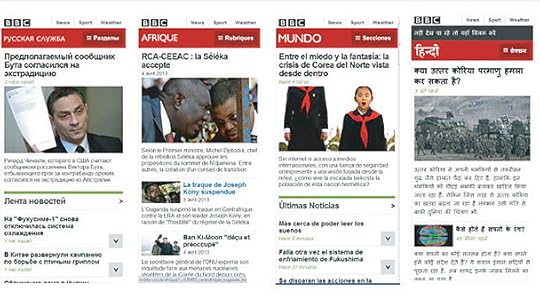
The new Russian, Afrique, Mundo and Hindi Responsive Mobile sites
These sites are a balance of re-using what we already have and adding some new features. There are three new things delivered in this tranche of sites.
Firstly, we have handled some new scripts: Cyrillic for Russian, and Devanagari for Hindi.
Secondly, the Hindi site has the option of an 'image' version – you can see this link in the grey bar just under the BBC blocks logo at the top of the page.
Many phones do not cope well with Hindi scripts so for a number of years we have offered a version of the site with all the text turned into images. This is the first time that we have offered this functionality on the responsive sites and we will use it again for other Asian languages.

The new Rolling News module on Russian and Mundo
The biggest piece of new functionality we have developed is the 'Rolling News' module which is visible in Russian and Mundo.
This sort of module is not widely used in English-speaking markets but is common in other languages: for examples, you can see it on the Russian Kommersant and the Argentinian El Pais news sites.

On the left, the Russian Newspaper Kommersant and on the right the Argentine El pais
This module is for mid-length, or 'fleeting' stories: longer than a tweet, but shorter than a full article and commonly without a picture.
Our old sites had a Rolling News module but our responsive solution is an advance on this: viewers with smartphones can now see these rolling stories without leaving the homepage, though there is still a page-per-story which can be addressed and shared. Again, this is a solution that can be re-used for other markets where appropriate.

Rolling News module on the Russian homepage and on the right the story opened up
As more and more sites move into the Responsive News product we have begun to see how the characteristics of different languages push and pull the limits of the product.

Russian v Hausa v English
We can see that the brand name for Russian, Русская служба (Russkaya Sluzhba or Russian Service) is so much longer than the English 'News' that the masthead has had to be reduced in size quite radically.
Similarly, the summaries in Russian are very long, something which appears to be a natural feature of the Russian language - see again our competitors in Kommersant and Ria Novosti:

On the left, Kommersant and Ria Novosti have long summaries as does BBC Russian news top right. BBC English news bottom right is much shorter
These things arguably make for a reduced visual impact, at least in comparison with versions like English or Hausa. However, with very few exceptions – you know, things like catching bubonic plague or the early work of Lloyd Cole – there is very little which is entirely bad or entirely good in this world and putting up with these stylistic imperfections has allowed us to hugely increase the velocity of releasing the sites compared to making everything bespoke for every language.
Indeed, Mundo, the most popular of the World Service sites, took about three weeks to make: we had already built the Rolling News module for Russian so the only thing we had to do was get the news stories into the system and then configure the organisation of the homepage in association with the Mundo team.
This means that our audiences get a product much more quickly than they would do if we did large amounts of bespoke work and as I said in an earlier blog post, Responsive Design is an excellent match for World Service markets so getting the sites to market has real advantages.
Hausa, our most mobile market with over 1000 different models of mobile phones accessing the site every week, has seen double-digit growth in audience numbers since the site was relaunched in responsive design.
These figures have certainly been helped by the glorious victory of Nigeria's Super Eagles football team in this year's African Cup of Nations, but I believe that at least some of the growth can be put down to the site responding to the capabilities of the users mobile phone and giving them the best possible experience.
So: the number of World Service languages that now have responsive mobile sites has increased to six. Just 21 to go! As always, I would like to thank the team who have done all the work to make this possible and who are already working on the next tranche.
It's a vast effort to make a successful news website and the team working on these sites couldn't even have got started without the other News teams and journalists in each service making the content management system, manning the servers and so on – and I would like to take the opportunity to thank everyone who has contributed.
As I leave the BBC I hand over the continuing development of the World Service sites to my friend and colleague Peter Deslandes the executive product manager for News, and his team. In tandem with English language they will continue moving World Service sites to responsive while enhancing and developing its features. I will be following it with great interest and am looking forward to the day that all users are seeing this excellent product, no matter what language or device they are using.
Phil Buckley is the outgoing executive product manager for the World Service Websites.
April 12, 2013
What's on BBC Red Button 14 - 21 April
Get ready for a packed week of sport on Red Button with coverage of the Chinese Grand Prix from Shanghai and the Masters Golf tournament in Augusta, Georgia. Sit back and enjoy the dulcet tones of jazz singer Caro Emerald who was live in concert for Radio 2 and test your antiques expertise with our popular Antiques Roadshow play along.
Radio 2 In Concert – Caro Emerald

Dutch singer Caro Emerald will delight fans on the Red Button this week
Caro is a stylish Dutch singer whose debut album sold more copies in Holland than Michael Jackson’s Thriller. She performed live at the BBC Radio Theatre on Thursday 11 April and you can continue to watch highlights from the show on Red Button.
Both Caro and her band are great, charismatic performers – previously seen on Red Button at Radio 2 Live in Hyde Park 2011 - so we are delighted to welcome her back.
BBC Radio 2 made Caro’s Riviera Life the Single of the Week and Deleted Scenes from the Cutting Room Floor was Album of The Week too. She’s visiting Radio 2 ahead of a UK tour later this year so we are lucky to have this early look.
Available on Freesat/Sky/Virgin Media/Freeview
Monday 15 April, 7am-11am, 6pm-9pm
Tuesday 16 April, 7am-11am, 3pm-6pm, 10.45pm-6am
Wednesday 17 April, 6am-7pm, 10pm-6am
Thursday 18 April – all day
Friday 19 April 6am-7.30pm, 9.30pm – 11.30pm
Antiques Roadshow Play Along
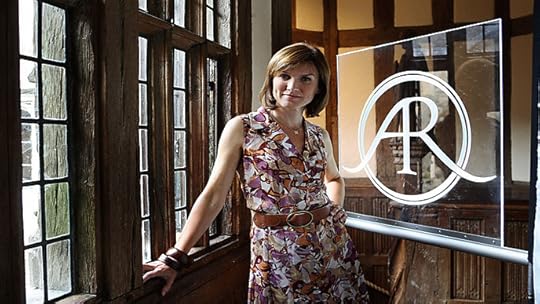
Antiques buff? Test your valuation prowess with Fiona Bruce
Fiona Bruce and the experts make a return visit to Cheltenham Town Hall as visitors arrive for another busy day of evaluations on this week's Antiques Roadshow. Featured family treasures include a valuable silver fruit bowl damaged when thrown during a domestic tiff, artefacts from Captain Scott's last expedition to the South Pole and a humble house brick with an important story.
You can join in with the programme by pressing red to guess the valuations in real time. Your score is ranked and you’ll discover whether you’re an antiques armchair expert.
You can now also play along on a mobile or tablet by downloading the play along app. Find out more and read the step-by-step instructions to play via Red Button. Don't forget to tweet your scores to #antiquesroadshow.
NB: Please note that there will be no Red Button play along on the 21 or 28 April. However, you can put your feet up and play along using the app which you’ve already downloaded on your phone or tablet.
Available on Sky and Freeview
Sunday 7 April, 7.55pm-9pm
Sport highlights
It’s an exciting week for sport on the Red Button with the promise of a thrilling Chinese Grand Prix and continued coverage of the highly anticipated Masters Golf tournament.
After the high-drama of the Malaysian Grand Prix will Mark Webber and Sebastian Vettel put team interests first in Shanghai? We’ll be showing pit lane action from the qualifiers followed by a repeat of the race itself and all the post-race analysis. See whether Jenson Button can revive his title challenge hopes after a poor start to 2013. It’s going to be unmissable viewing.
Turning to golf, you can watch highlights of the second round of the 77th Masters from the world-famous Augusta National course in Georgia. Rory McIlroy has set his sights on glory but will he edge closer to a third major title win? And if that’s not enough you can get your fix with the Masters Amen Corner on Sunday evening.
Later on in the week look out for the Triathlon World Series event in San Diego. Jonny Brownlee is out of the competition due to injury but his gold-medal winning brother Alistair will be hoping to add to the family’s trophy cabinet.
For the latest information, refer to the BBC Sport website.
Please note all Red Button times are subject to change at short notice.
Links: BBC News app and iPlayer content
Hi, it’s been a while since our last roundup of news and conversation about BBC Online and it’s been a busy few weeks.
BBC News have released a new version of their iPhone and iPad app. Steve Herrmann on the BBC Editor’s blog discusses the new layout and faster loading speeds as well as a bug fix based on a “fairly major reworking of the app's code. The good news is that they are now working from a more stable base which can be built on with new features and functionality.”
Significantly the code revision “is something we've already done with our Android app, so we'll now be able to release upgrades simultaneously on both iOS and Android”

BBC News on mobile
Microsoft employee Lawrence Gripper has removed his version of the BBC News app for Windows phones and Windows 8 from the Windows Store.
“These have been a labor of love for me since the launch of Windows Phone in 2010 and it is with great sadness today that I removed both applications from the store.”
The BBC stated to The Verge:
“The BBC has clear terms of use that are designed to enable further distribution of BBC content and services in a way that is fair to all parties, and does not imply authorisation or endorsement by the BBC. These are available at www.bbc.co.uk/terms. In this case, the terms of use were unfortunately not met, and we have therefore asked for the app to be removed.”
The news of a BBC One commissioned, Peter Kay penned sitcom to be released first on BBC iPlayer generated interest. BBC One controller Danny Cohen commented:
"It is hugely exciting that Peter Kay is coming to BBC One with his new series - even more so with the innovative plan we have to launch the show online."
This is hot on the heels of news that BBC Three has commissioned six original short films to be aired first on iPlayer. BBC head of IPTV and TV online content Victoria Jay commented:
"This ambitious new strand builds on BBC iPlayer as a creative platform to bring original British drama to audiences online, and explores storytelling outside of a scheduled TV slot or duration […] Audiences will be able to discover, share and enjoy these dramas whenever and wherever they choose."
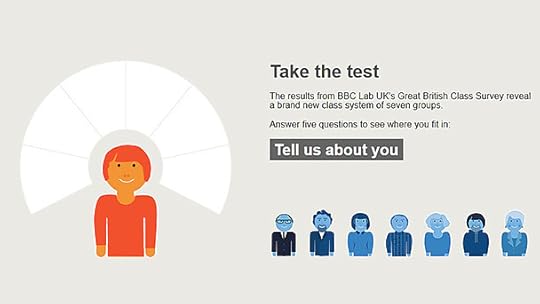
BBC Class Calculator
The death of Baroness Thatcher dominated many social media platforms this week. Jim Manning tracked the positive, negative and neutral tweets related to the BBC Question time hashtag #bbcqt, used during an edition focused on the former prime minister.
The Guardian reported on how the huge demand for archive footage relating to the ‘Iron Lady’ exposed problems with the BBCs new tapeless news room in New Broadcasting House London:
“According to one BBC insider, after the death of Thatcher on Monday at one point there were four producers in the bulletins area queuing up to use the one tape machine that had been provided and in Newsnight's area "there are tapes all over the place". One BBC current affairs source said: "We have a multimillion-pound digital archive and we are delivering tapes on the tube"."
While The Guardian also discussed the challenges faced in the Digital world for new BBC Director General Tony Hall:
“While TV and radio will remain central to what the BBC offers licence payers, and as such both need proper focus and attention to keep them up to the creative mark, Hall sees digital strategy, set free from control by traditional departmental baronies, as key to the BBC's future standing as the national broadcaster.”
The BBC Class Calculator widget caused lots of buzz last week attracting six million users by last Friday. Audiences created their own versions of the seven class types using some creative photo-shopping skills.
A reminder of Olivier Theroux’s post on the launch of the new BBC Research and Development website:
“We should not design and constrain every possible way people could discover our content. That thinking in terms of ‘user journeys’ or linear narratives through our archives would hinder, not help, the discovery. Instead we aimed to make discovery as free-flowing as possible."
While our colleagues at the BBC College of Production have had a busy time hosting a live Q&A with senior UX&D designer Emer McPolin:

College of Production live Q&A
The commercial release of Stagebox was also announced on the blog:
“Stagebox is a broadcast production device that attaches to the back of a camera, enabling programme makers to link multiple cameras and move HD content over standard Internet Protocol (IP) networks.”
The announcement met with positive feedback from Turquoise Branding:
“From a production standpoint this is very exciting because it has the potential to streamline the production workflow immeasurably. […] News broadcasters may now be able to escape the 90’s and take one giant leap into the 21st century.”
That’s all for the moment folks, have a great weekend.
Eliza Kessler is content producer on the BBC Internet blog.
April 9, 2013
New Research and Development Website
Hi I'm Olivier Thereaux, a senior technologist in the BBC Research and Development (R&D) department.
Within the team called Internet Research and Future Services I work on all things Web, from coordinating our work defining future standards with the World Wide Web Consortium to making sure we use the full potential of the web in our research and prototypes.
That includes making sure we use the web efficiently to communicate our department's research and so, this week, we are releasing a beta version of the new BBC R&D website.

The new R&D website
The R&D department of the BBC is fairly unique. Even in the media and broadcast industry, few organisations conduct research along the whole broadcast chain.
For many decades BBC R&D has been driving innovation in the capture of audio and video, the production tools and processes and the delivery of content through cables and airwaves, from the early designs of radio microphones to digital and high definition television.
We also look at new and better ways to help our audiences discover and experience our programmes. The broadcast chain and those five research areas are a key aspect of our identity and you will find them at the very heart of our new website.
Another reason why our R&D department is quite unique is that we don't just create insight and innovation for the BBC, but for the whole industry. Openness and collaboration is in our DNA and that means we have to work very hard to make sure that potential partners for our research know exactly what we are up to and that anyone in the industry can easily find the body of work we have been building since the 1930s.
So when we set out to refresh our website at the end of the summer of 2012 we aimed to:
Showcase the exciting work happening at BBC R&D,Make it really easy to find relevant content from the research and knowledge accumulated over the decades,And in the long run, build an online space where BBC R&D can truly act as a catalyst for world-class research and development for our industry.
Easier said than done, but we knew we had a few good tools at hand to give it a fair try: several of our recent projects revolved around the idea of opening large archives or using the web to explore a large universe of themes, people and events. In other words this was a case of eating our own dog food.

Search for content around the five research areas
What did our experience tell us? Mainly that we should not design and constrain every possible way people could discover our content. That thinking in terms of ‘user journeys’ or linear narratives through our archives would hinder, not help, the discovery.
Instead we aimed to make discovery as free-flowing as possible by:
Defining what the ‘things’ we wanted to present are: people, projects, publications and so on.Giving each thing a page and a page per thing.Linking things together and presenting relations in context.
In effect it means that a visitor to the site should be able to land on any page (from a link or a search engine query) and navigate from there, hopping from a journal publication to the project which it documents, to the profile of an engineer who worked on the project, to an index of the research topics that person specialises in, and so on, without end.
If we could replicate the enthralling experience of diving endlessly into Wikipedia, if our visitors occasionally got lost in the wealth of content rather than getting lost in the complex mesh of expert jargon and acronyms, we would know we had succeeded.
Unfortunately such a heavily interlinked architecture of information made it nearly impossible to re-build our site with typical Content Management Systems (CMS), where pages tend to be organised in a single tree of parent and child pages and with a single set of categories.
Working with the usual in-house systems used at the BBC was, for the same reasons, out of the question. After much testing we eventually settled on the little known but powerful Locomotive system, an open source CMS with a knack for connecting things together and a nice back-end interface to manage both the content and its complex network of relationships.

Content tagged around research topics
We also needed a simple vocabulary to describe what BBC R&D does. That too was an interesting challenge given our long history and diverse body of work. When we compiled all the tags and keywords used in the past to describe our work the total ran over 2000 words!
It took us quite a few card sorting exercises, a sprinkle of diplomacy (we R&D engineers can get attached to our pet keywords), a few arbitrary decisions (Delivery or Distribution? Both very suitable. Flip a coin.) and a lot of patience to end up with two ways of categorising our projects:
The five stages of the broadcast chain - as mentioned earlier,And a small vocabulary of less than 30 research topics.
By ‘tagging’ every project and other content on the site with those research topics we are able to build automated indexes to facilitate discovery.
One reason to limit the number of topics for navigation is that we wanted each of them to aggregate a decent amount of content. What's the point of ‘tag clouds’ where each topic is, at best, shared by only a couple of items? Our topics are a little broad but it means that anyone can easily browse through the breadth of work we've done in areas such as audio or recommendations.
The other reason to keep the list to a reasonable length is that we wanted to keep it all at a human scale. A scary long list would play against that. That ‘human’ factor was also a reason why we put a certain emphasis on people as a link between projects and why we toned down the visual design from an obsession with green fibre optics and other sorts of cables to something still unashamedly techie… but a little less so.
Throughout the project a lot of effort was put into making the site more user-friendly, but not just for its visitors.

The old R&D site
Early on we realised that our biggest challenge would be to make it the site which R&D teams would naturally use on a daily basis to learn about what the rest of the 200-strong department is up to, collaborate with our many project partners and communicate with the world in a spirit of open innovation.
This remains our challenge, even though we have already made it so that our colleagues can publish information and updates about their projects in an easier way than ever before.
We are planning for more content to be added or migrated from the 'old' site and features to be added beyond the current beta period. One such feature is the R&D blog, which we are integrating with the main R&D site.
There won't be any way to comment on blog posts for the time being as we take the time to figure out how to best create and nurture conversations around the new site. In the meantime we welcome conversations on twitter. You can find us there at @bbcrd.
As you will see it is still a beta. So please tell us your thoughts, hunt for and report bugs you encounter and with your help we will continue building an ever-evolving, truly world-class website for research and innovation in broadcast and media.
Olivier Thereaux is a senior technologist in BBC R&D.
BBC's Blog
- BBC's profile
- 28 followers



